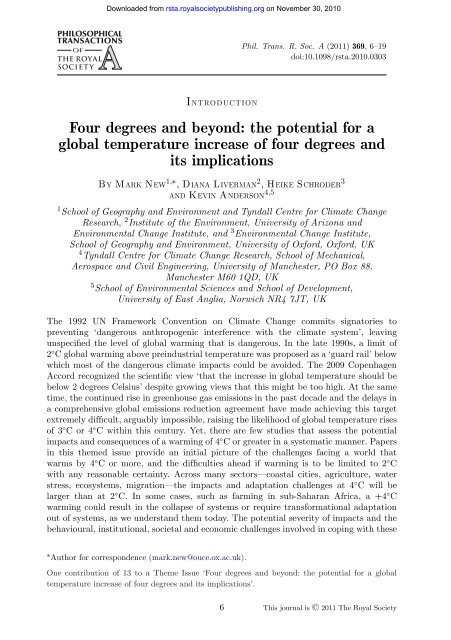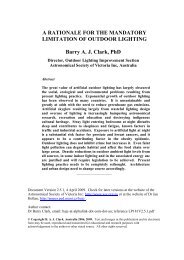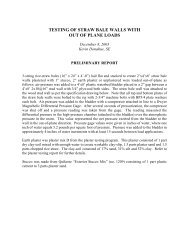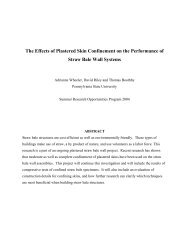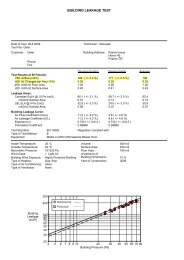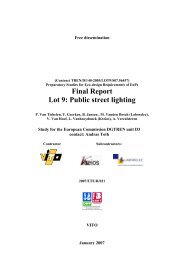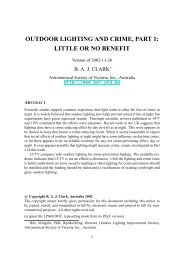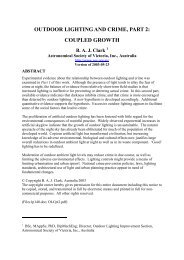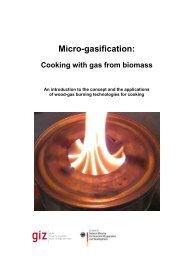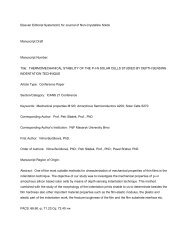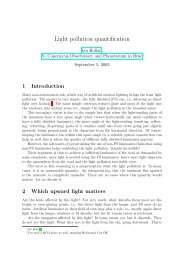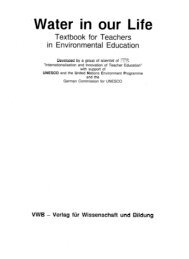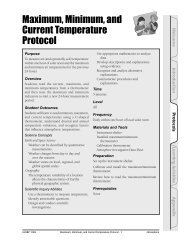Four degrees and beyond: the potential for a global ... - Amper
Four degrees and beyond: the potential for a global ... - Amper
Four degrees and beyond: the potential for a global ... - Amper
Create successful ePaper yourself
Turn your PDF publications into a flip-book with our unique Google optimized e-Paper software.
Downloaded from<br />
rsta.royalsocietypublishing.org on November 30, 2010<br />
INTRODUCTION<br />
Phil. Trans. R. Soc. A (2011) 369, 6–19<br />
doi:10.1098/rsta.2010.0303<br />
<strong>Four</strong> <strong>degrees</strong> <strong>and</strong> <strong>beyond</strong>: <strong>the</strong> <strong>potential</strong> <strong>for</strong> a<br />
<strong>global</strong> temperature increase of four <strong>degrees</strong> <strong>and</strong><br />
its implications<br />
BY MARK N EW 1,∗ ,DIANA LIVERMAN 2 ,HEIKE SCHRODER 3<br />
AND K EVIN ANDERSON 4,5<br />
1 School of Geography <strong>and</strong> Environment <strong>and</strong> Tyndall Centre <strong>for</strong> Climate Change<br />
Research, 2 Institute of <strong>the</strong> Environment, University of Arizona <strong>and</strong><br />
Environmental Change Institute, <strong>and</strong> 3 Environmental Change Institute,<br />
School of Geography <strong>and</strong> Environment, University of Ox<strong>for</strong>d, Ox<strong>for</strong>d, UK<br />
4 Tyndall Centre <strong>for</strong> Climate Change Research, School of Mechanical,<br />
Aerospace <strong>and</strong> Civil Engineering, University of Manchester, PO Box 88,<br />
Manchester M60 1QD, UK<br />
5 School of Environmental Sciences <strong>and</strong> School of Development,<br />
University of East Anglia, Norwich NR4 7JT, UK<br />
The 1992 UN Framework Convention on Climate Change commits signatories to<br />
preventing ‘dangerous anthropogenic interference with <strong>the</strong> climate system’, leaving<br />
unspecified <strong>the</strong> level of <strong>global</strong> warming that is dangerous. In <strong>the</strong> late 1990s, a limit of<br />
2 ◦ C <strong>global</strong> warming above preindustrial temperature was proposed as a ‘guard rail’ below<br />
which most of <strong>the</strong> dangerous climate impacts could be avoided. The 2009 Copenhagen<br />
Accord recognized <strong>the</strong> scientific view ‘that <strong>the</strong> increase in <strong>global</strong> temperature should be<br />
below 2 <strong>degrees</strong> Celsius’ despite growing views that this might be too high. At <strong>the</strong> same<br />
time, <strong>the</strong> continued rise in greenhouse gas emissions in <strong>the</strong> past decade <strong>and</strong> <strong>the</strong> delays in<br />
a comprehensive <strong>global</strong> emissions reduction agreement have made achieving this target<br />
extremely difficult, arguably impossible, raising <strong>the</strong> likelihood of <strong>global</strong> temperature rises<br />
of 3 ◦ Cor4 ◦ C within this century. Yet, <strong>the</strong>re are few studies that assess <strong>the</strong> <strong>potential</strong><br />
impacts <strong>and</strong> consequences of a warming of 4 ◦ C or greater in a systematic manner. Papers<br />
in this <strong>the</strong>med issue provide an initial picture of <strong>the</strong> challenges facing a world that<br />
warms by 4 ◦ C or more, <strong>and</strong> <strong>the</strong> difficulties ahead if warming is to be limited to 2 ◦ C<br />
with any reasonable certainty. Across many sectors—coastal cities, agriculture, water<br />
stress, ecosystems, migration—<strong>the</strong> impacts <strong>and</strong> adaptation challenges at 4 ◦ C will be<br />
larger than at 2 ◦ C. In some cases, such as farming in sub-Saharan Africa, a +4 ◦ C<br />
warming could result in <strong>the</strong> collapse of systems or require trans<strong>for</strong>mational adaptation<br />
out of systems, as we underst<strong>and</strong> <strong>the</strong>m today. The <strong>potential</strong> severity of impacts <strong>and</strong> <strong>the</strong><br />
behavioural, institutional, societal <strong>and</strong> economic challenges involved in coping with <strong>the</strong>se<br />
∗ Author <strong>for</strong> correspondence (mark.new@ouce.ox.ac.uk).<br />
One contribution of 13 to a Theme Issue ‘<strong>Four</strong> <strong>degrees</strong> <strong>and</strong> <strong>beyond</strong>: <strong>the</strong> <strong>potential</strong> <strong>for</strong> a <strong>global</strong><br />
temperature increase of four <strong>degrees</strong> <strong>and</strong> its implications’.<br />
6<br />
This journal is © 2011 The Royal Society


